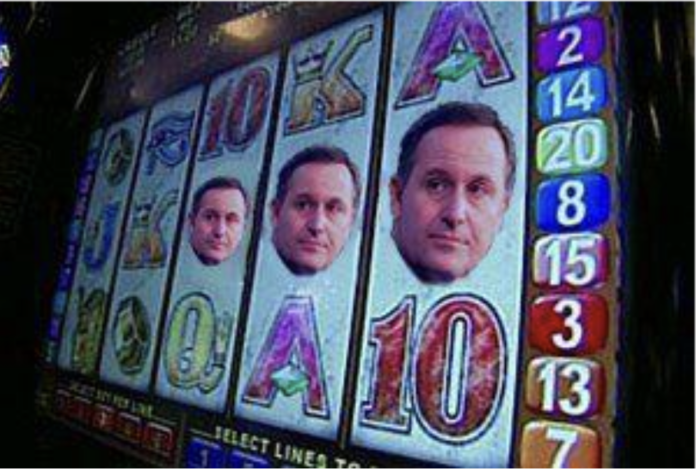Share buybacks have been used increasingly frequently by companies to reward shareholders and executives who hold shares. In New Zealand, they are a tax-free capital gain and investors don’t have to pay the tax they must on share dividends.
SkyCity Entertainment Group investors could get a boost this year, with the company saying it will buy back 5 percent of its shares on the NZX over the course of 2019.
The buyback, starting next week, would be worth $135 million at the current share price.
SkyCity’s announcement came as it reported an 11.4 percent fall in first-half net profit to $82.8 million even as revenue was up 1 percent at $460.2 million.
Josh Wilson, senior portfolio manager for NZ Funds, says stock markets normally react positively to news of a share buyback – it’s good to have a big buyer in the ring.
And the move likely shows the influence of the company’s chair Rob Campbell, he says.
(Board Chairman Rob) Campbell would argue “if nothing is competing for the company to invest in, the money is best going back to shareholders.”
SkyCity chief executive Graeme Stephens has sold $1.3 million of shares within days of the casino company resuming its on-market share buyback.
Details of the share sale are in a market disclosure filed to the NZX late on Friday.
According to the disclosure, Stephens sold 325,000 shares on August 23 for $3.94 a share pursuant to a personal debt reorganisation.
The shares match the number of “commencement shares” issued to Stephens for free in November 2016, which vested two years into his tenure.
The shares had no performance targets.
On August 19 SkyCity resumed its on-market share buyback programme begun in April, which had been on pause since late June to allow for the annual results to be announced.
That week the share price rose from its previous close of $3.84 to a closing high of $3.92.
According to SkyCity disclosures the company bought $3.8m of shares over the three days to August 21.
The practice of corporate share buybacks has been correlated in some research to the prevalence of executive incentive schemes.
Last June US Securities & Exchange commissioner Robert Jackson gave a speech expressing concern about how buybacks were being used.
“There is clear evidence a substantial number of corporate executives today use buybacks as a chance to cash out the shares of the company they received as executive pay,” he said.
“Executives often claim that a buyback is the right long-term strategy for the company, and they’re not always wrong. But if that’s the case, they should want to hold the stock over the long run, not cash it out once a buyback is announced. If corporate managers believe that buybacks are best for the company, its workers, and its community, they should put their money where their mouth is.”
SkyCity chair Rob Campbell said the share sale by Stephens was reviewed by the board and met the company’s policy for executive share trading.
“There is a formal process and Graeme’s application to trade was within the terms of the formal process so it was approved,” he said.
“I really can’t add anything to that.”
Alongside the disclosure of Stephens’ share sale, SkyCity said it had allocated long-term incentive shares to nine executives, including Stephens, at $3.895.
Chair Rob Campbell also bought 17,200 shares on August 23 for $68,065, or $3.957 a share.
SkyCity’s share buyback was announced in February. The company said it “considers that buying the company’s shares at current prices is an efficient use of surplus funding capacity and will be value-enhancing for shareholders.”






NZ and many companies have become encapsulated to employing managers who then run the company to benefit themselves.
We saw this with Fonterra (CEO averaged an 8 million salary per annum for 7 years leaving the corporation worse off, record losses and making key staff redundant) and many large NZ listed companies who then suffer huge losses while empoverishing their employees in the good times.
This has been abled by our mass immigration policies as more workers are bought in, to replace those choosing to leave a company that they can not get ahead working there. The Ponzi then continues as the new staff also leave for exactly the same reasons they could not get staff in the first place. This has now got out so NZ is not a desirable place to work in with NZ being voted 2nd lowest place to work by migrants surveyed out of over 50 countries while OZ with higher wages was 9th. https://www.theguardian.com/world/2022/jul/14/100-pure-rip-off-new-zealand-voted-second-worst-place-to-move-to
The NZ sharemarket is known as the ‘Wild West’ with many poor regulation and policies to set up to enrich schemes to big players and their executives at the expense of smaller share holders.
NZ has a big case of killing the golden goose. Neoliberal policy is designed for a short term, ‘pretty legal’ frauds and exploitation, that kills the golden goose to gain, while destroying the actual riches in the process.
I do have to say if I had pots of money I would not invest in the corrupt bear pit of unregulated theft that the NZ stock market is.
Ba ha! Brilliant piece @ M.T.
What an embarrassing, Mickey mouse cluster fuck AO/NZ is in some respects. We’ve become a sad old thing dressed in sequinned tights standing under a cold, draughty ,macrocarpa hedge down a lonely country road looking for trade.
Do you watch Russell Brand on YouTube @ M.T.? He often strips down corruption and insider trading by using experts in their various fields.
Skydump’s sociopathic executives have effectively just dumped its corruption on its employees, and us tax payers by extension. OMG. So new. Unique. That’s what makes America great.
I love to help. I really do. So here’s an idea for the SkyHigh Casino.
The New York Times.
“…3,000 Sticks of Dynamite.”
https://www.nytimes.com/2021/02/17/nyregion/atlantic-city-trump-plaza-implosion.html
Perhaps off-topic. Well, actually, entirely off-topic, but what do you think of a Farmers Union? Could you write something about farmers and general agrarians forming a union in association with their down-stream service industry workers to beat off the Wolves? No disrespect to actual wolves.
I think it’s overstepping the mark to sell your shares within days of a share buyback announcement for an inflated price. Graeme Stephens isn’t the first executive to practice this, though.
Yes it is correct that the shares in that company had been weakened before Covid hit and, yes, perhaps it wouldn’t have been so bad for skycity if there was a capital gains tax applicable on the profits made.
https://www.nzherald.co.nz/nz/pm-grilled-on-skycity-connections/EC5LS43ALPQK5LC74JHERQOSYA/